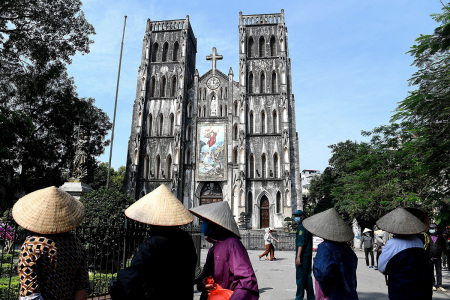Hmong Christians suffering severe persecution in Vietnam

Severe persecution of Hmong Christians is underway in Nghe An Province in Vietnam.
In the central Vietnam province, officials vying with each other to create “Christian-free zones” operate “with no conscience or humanity,” as if they were in a different country than the one whose religious freedom measures they are violating, Christian leaders say.
Authorities put immense pressure on animist relatives to drive Christians from their homes, exiling them from family, livelihood and community with nothing but the clothes on their backs. Some Christians have been forcibly separated from spouse and children, home and fields, sometimes even their wedding rings, if they persist in their faith. Then officials wash their hands and say these outrages are purely family matters.
The only way out is for the offending Christians to recant and revert to the animistic practices of their ancestral religion. Most steadfastly refuse to give up their new-found faith, which they testify has freed them from demonic oppression.
More often than individuals, it is entire extended Christian families who are driven from their homes, but earlier this month one mother was separated from caring for her two sons. Though only 33, Lau Y Pa has two teenage sons whom she was unable to contact. When Morning Star News met with her on July 10, wet tissues were piled in front of her as she had just learned that another newly Christian relative, Lay Y Tong, had suffered the same fate.
Such suffering, which has been quietly going on for years (especially in Nghe An Province), has hit mainly members of the not-yet-legally recognized Vietnam Good News Mission Church (VNGNMC) and the officially recognized Evangelical Church of Vietnam-North (ECVN-N).
The VNGNMC connects its victims with congregations and Christians able to shelter them in the provincial capital of Vinh, or in Saigon or Hanoi.
Both church organizations report the worst violations of religious liberty are taking place in the Ky Son District communes of Huoi Tu and Na Ngoi. Two extended families of 13 and 19 people in the Na Ngoi commune villages of Khu Kha I and Ka Duoi respectively have been regularly pressured and persecuted since April, when they were officially accepted as members of the government-recognized ECVN-N.
Gangs of top local officials and police officers, numbering up to 20, come repeatedly, sometimes in the middle of the night, browbeating and bullying them and threatening worse unless they return to spirit worship. Refusal to recant for these families has meant the seizing of their livestock, crops, fields and farm machinery and tools, the ransacking of their homes and cutting off their electricity. It has resulted even in refusal to let their neighbors charge their cell phones.
In the worse cases, villagers are pressured into seizing all the Christians’ property and driving them out of their community. This has happened regularly to ethnic minority families in various parts of northern Vietnam in recent years; such treatment leaves less photographical evidence than beatings but has graver consequences.
ECVN-N leaders have appealed to local officials and federal agencies for redress by phone and in writing, pointing out that government officials are breaking specific articles of the national Law on Belief and Religion. Church leaders’ attempts to visit the persecuted have been blocked, and they have received no response from any government agency.
The VNGNMC has written and/or phoned the commune, four district level agencies, four provincial level ones, and five federal ones. These appeals cite provisions of Vietnam’s religion law that authorities have broken. Church leaders have received no reply, leading them to believe they have no redress.
The VNGNMC also has just reported the case of Vu Ba Sua; because of her faith, officials have refused to register the birth of her baby, now over 2 months old. This makes the child ineligible for social benefits.
Sua took the child to the Ky Son hospital for a lung infection but was refused help. The hospital informed her that no Christians in Ky Son District were eligible for any government assistance. Further, because Sua and her husband made it clear they would not give up their faith, officials came to their home and confiscated livestock the government had earlier provided them.
Nghe An Province is the birthplace of Ho Chi Minh and thus proudly considered the cradle of the communist revolution. Officials compete for the honor of calling their jurisdiction “a Christian-free zone.”
Church leaders have found that they are sometimes better off working out problems quietly with local officials rather than reporting abuses for international exposure and advocacy. At this point, without any response to months of patient and polite requests for redress, the church leaders are left with no choice but to ask for international assistance and pressure. The serious religious liberty abuses in Nghe An Province, completely contrary to Vietnam’s own laws, beg for an international spotlight.
It is easy to blame solely recalcitrant local “outlier” officials, but the refusal of any Vietnamese authority to intervene is inexcusable and argues for embarrassing exposure and international accountability.
The urgent request of church leaders was, “Please intervene for our persecuted Christians now!”
Originally published at Morning Star News
Morning Star News is the only independent news service focusing exclusively on the persecution of Christians. The nonprofit's mission is to provide complete, reliable, even-handed news in order to empower those in the free world to help persecuted Christians, and to encourage persecuted Christians by informing them that they are not alone in their suffering.






















